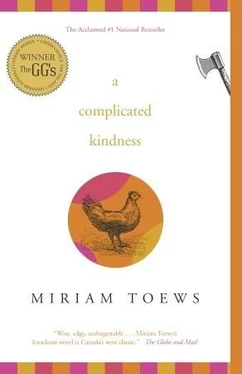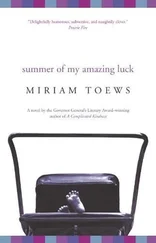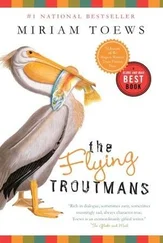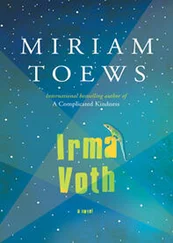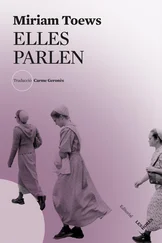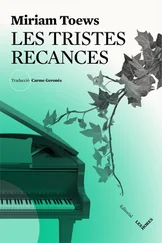A Mennonite telephone survey might consist of questions like, would you prefer to live or die a cruel death, and if you answer “live” the Menno doing the survey hangs up on you . Imagine the least well-adjusted kid in your school starting a breakaway clique of people whose manifesto includes a ban on the media, dancing, smoking, temperate climates, movies, drinking, rock ’n’ roll, having sex for fun, swimming, makeup, jewellery, playing pool, going to cities, or staying up past nine o’clock. That was Menno all over. Thanks a lot, Menno.
There is also something annoying about a man who believes in complete humility naming a group of people after himself. And using his first name. Nominites. Hmm. Maybe after my sojourn at the slaughterhouse I’ll start a people. At times I find myself imagining Menno as a delusional patient in an institute off some interstate in a pretty, wooded area. Shuffling off to Group, hoarding his meds. That I belong within the frightful fresco of this man’s dream unnerves me. I wonder what exactly happened in Menno’s world that made him turn his back on it. I wonder what a re-enactment of a typical day in the childhood life of Menno Simons would look like. I’ve heard of Tolkien and Ursula Le Guin and the guy who wrote Watership Down, that delightful allegory about rabbits. But I’m not a fan of fantasy. There’s so much of that being crammed down our throats every day in this place. The mark of the beast? Streets paved in gold? Seven white horses? What? Fuck off. I dream of escaping into the real world. If I’m forced to read one more Narnia series book I’ll kill myself. I would love to read the diary of a girl my age — a girl from the city. Or a textbook on urban planning. Or a New York City phone book. I would kill to own a New York City phone book.
Trudie always said her eyes were hazel, but in fact they’re the same smoky green as Ray’s. Trudie and Ray are second cousins. Which makes me and Tash not only sisters but also third cousins. There’s no deep end in this town’s gene pool. That sounds like a worn-out joke, but it’s not to us. No, she said, they’re hazel. I’m putting hazel on my passport. Look again. Tash and I looked and saw nothing that looked like hazel, no flecks, no dots, no threads, but we said okay, they’re hazel, fine. And what do you need a passport for anyway, my sister had asked. Trudie said for identification. I think it made her feel adventurous to own a passport, to think she actually might one day get on a plane and fly away to a magical place with a temperate climate where people dance.
Mennos are discouraged from going to the city, forty miles down the road, but are encouraged to travel to the remotest corners of Third World countries with barrels full of Gideon Bibles and hairnets. Maybe that’s where she is now — planting churches in the Congo, wearing a pretty floral ankle-length dress, rubber boots and a straw hat. But I doubt it. That’s what The Mouth did with single older women who were probably gay but were called spinsters — sent them off to hot places with a shovel and a monthly allowance and a camera so they could come back every couple of years and set up a slide show in the church basement for all the little Mennos. At the end of the slide show the surliest guy from the village always comes around to see the light and starts wearing clothing and helps the white gay women with their good work in spite of threats and disapproval from his own people. Sometimes the missionaries are killed. But that’s just how it has to be. There’s usually a strange, simmering sub-plot in these slide shows that involves either running the witch doctor out of town or getting him to smile for the camera while holding up a copy of the New Testament, which means, praise the Lord, he’s been saved. After the slide show we eat cheese and buns and maybe play a little hide-and-seek, with groping, in the foyer.
Anyway, I can’t picture my mother as a missionary. I can see her doing other things like deep-sea diving or leading groups of tourists around places in Europe. Trudie was short for Gertrude, which she hated a little less when she found out about Gertrude Stein and all those cats in Paris. She had always wanted to see Paris. She used to sing all those old Jacques Brel songs with a thick French accent. She sang them up big, comically, but Tash told me it was a façade . She said Trudie was punch-drunk crazy from the endless domestic grind-a-thon. Said her back was up against the wall of an oppressive patriarchal regime.
Trudie loved to read but mostly she read mysteries (even though the current thing to say around here is: There are no mysteries!) or books about the Holocaust. She loved to say unreal. That’s just unreal, she’d say about things that surprised or disappointed or amazed her, and there were lots of those things it seemed. She also enjoyed the word wheeeeeee, said with gusto — a reaction to whatever little thing was turning her on. We as a family in a little motorboat on big waves. We as a family coasting down a hill with the car in neutral. We as a family chopping down a Christmas tree. We as a family. Another thing she said a lot, when she was reading, and didn’t want to answer whatever question we had interrupted her with, was: Whaaaaaatttttt?? An incredibly drawn-out word with a lot of vocal range from low to high to sustained high. She’d keep her eyes on her book. Hey Mom, I’m going outside to pour some gasoline over myself and light a match! Whaaaaaatttttt? Eyes never leaving the page. I loved it.
My mother’s dream was to go to the Holy Land. She was very intrigued with Jews. There were none in our town. There were no black people or Asians either. We all looked pretty much the same, like a science fiction universe. My sister and I went to school in the morning and my mom would stand in the doorway in her nightgown and say goodbye, goodbye, I love you, good luck, have fun, until we couldn’t hear her any more, like we were foreign sailors leaving a port of call after a fantastic unreal night together, and we’d come home at four o’clock in the afternoon and she’d still be in her nightgown, but on the couch, with her finger as a marker in the book saying hello, hello, how was your day? Don’t tell me it’s after four already. It is, we’d say. What’s there to eat? And my mom would sit up real fast and say, usually, oh I sat up too fast, and we’d wait for five seconds for her to clear her head. She had bright red down-filled slippers that were almost perfectly ball-shaped. In one hour she’d have gotten dressed, gone to the grocery store, the Tomboy (who names grocery stores after gender anomalies?), bought stuff for supper, come home, made the food, and put it on the table, smiling, happy, warm and untroubled.
She was a whiz with Klik, that canned meat that looks like crushed human flesh and comes with a built-on key you twist around to open the tin. I wish I had harder facts about her, a complete picture with high tone definition, but she was hard to pin down.
There was something seething away inside of her, something fierce and unpredictable, like a saw in a birthday cake. She played content like Jack Nicholson played crazy in One Flew Over the Cuckoo’s Nest, but Ray truly was content to sit at the head of the table in his suit and tie and joke around with his two relatively normal daughters and fun-loving wife who had hazel eyes and sexy nighties and a passport with a glamorous black-and-white photo of herself tucked away in the top drawer of her dresser.
The place Trudie travelled to most often was the church basement. The women have to spend a lot of time there. If they don’t they go to hell. (Who’re you gonna serve? Missionaries in Botswana, or Satan? That’s right. Any questions? Didn’t think so.) Their job was to sew clothing and blankets for the missionaries and send it all overseas in barrels. Trudie hated it. She got into trouble for throwing a couple of romance novels into a barrel headed for Nicaragua. She was supposed to do all sorts of stuff at church, cook for weddings and funerals, quilt, teach Sunday school and just generally get her ass in humble helping gear. They were always calling her and asking her if she could spare some time to help out. It wasn’t really a question. She’d go sometimes at the very last minute saying oh I should go, I should go right now.
Читать дальше
